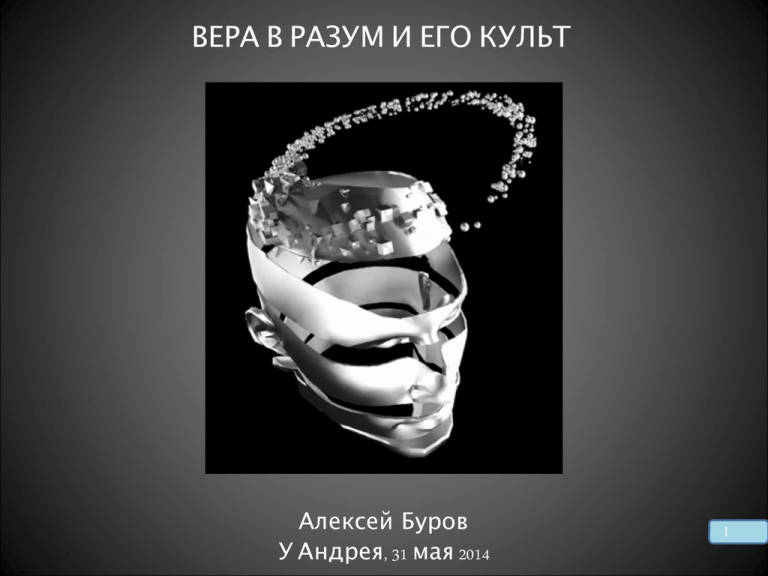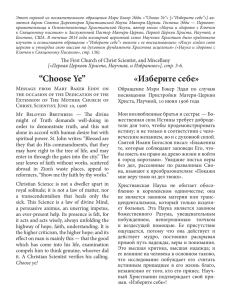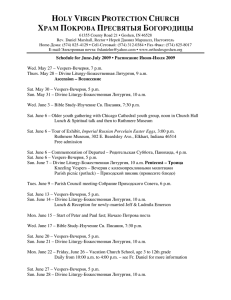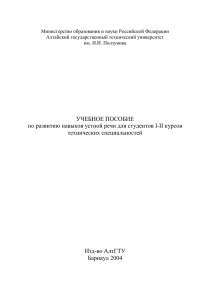вера в разум и его культ - Fermi Society of Philosophy
реклама

ВЕРА В РАЗУМ И ЕГО КУЛЬТ Алексей Буров У Андрея, 31 мая 2014 1 Вера фундаментальной науки 1 Faith and Reason Three approaches to the problem: Reason => Faith ? (Platonism, Natural Theology, Scientific Atheism) Reason || Faith (Complete separation) Reason and faith are vital for each other. Einstein: Faith without reason is blind; reason without faith is lame. ! Thus, according to Einstein, reason is empowered by faith, while faith has to be seen and tested by reason: ! ! ! Faith awareness correction birth Reason power Let’s see how does it work for fundamental science. What faith empowered it? Is anything to be corrected in that faith? 3 Cosmic Religious Feeling “ . . . я утверждаю , что космическое религиозное чувство является сильнейшей и благороднейшей из пружин научного исследования. Только те, кто сможет по достоинству оценить чудовищные усилия и , кроме того , самоотверженность , без которых не могла бы появиться ни одна научная работа , открывающая новые пути , сумеют понять, каким сильным должно быть чувство, способное само по себе вызвать к жизни работу, столь далекую от обычной практической жизни. Какой глубокой уверенностью в рациональном устройстве мира и какой жаждой познания даже мельчайших отблесков рациональности, проявляющейся в этом мире, должны были обладать Кеплер и Ньютон , если она позволила им затратить многие годы упорного труда на распутывание основных принципов небесной механики! 4 Cosmic Religious Feeling “I maintain that the cosmic religious feeling is the strongest and noblest motive for scientific research. Only those who realize the immense efforts and, above all, the devotion without which pioneer work in theoretical science cannot be achieved, are able to grasp the strength of the emotion out of which alone such work, remote as it is from the immediate realities of life, can issue. What a deep conviction of the rationality of the universe and what a yearning to understand, were it but a feeble reflection of the mind revealed in this world, Kepler and Newton must have had to enable them to spend years of solitary labor in disentangling the principles of celestial mechanics! 5 Cosmic Religious Feeling Тем же, кто судит о научном исследовании главным образом по его результатам , нетрудно составить совершенно неверное представление о духовном мире людей, которые , находясь в скептически относящемся к ним окружении , сумели указать путь своим единомышленникам , рассеянным по всем землям и странам. Только тот, кто сам посвятил свою жизнь аналогичным целям , сумеет понять , что вдохновляет таких людей и дает им силы сохранять верность поставленной перед собой цели , несмотря на бесчисленные неудачи. Люди такого склада черпают силу в космическом религиозном чувстве. Один из наших современников сказал, и не без основания, что в наш материалистический век серьезными учеными могут быть только глубоко религиозные люди.” A. Einstein, Religion and Science, 1930. 6 Cosmic Religious Feeling Those whose acquaintance with scientific research is derived chiefly from its practical results easily develop a completely false notion of the mentality of the men who, surrounded by a skeptical world, have shown the way to kindred spirits scattered wide through the world and through the centuries. Only one who has devoted his life to similar ends can have a vivid realization of what has inspired these men and given them the strength to remain true to their purpose in spite of countless failures. It is cosmic religious feeling that gives a man such strength. A contemporary has said, not unjustly, that in this materialistic age of ours the serious scientific workers are the only profoundly religious people.” A. Einstein, Religion and Science, 1930. 7 Duty and Prophesy We must know. We will know. ! D. Hilbert, Retirement Address, 1930 8 Martyrdom 1633: For his “Dialogue”, Inquisition sentenced Galileo to home arrest, continued until the end of his life, 9 years. All his writings were banned from publication. He lived in his villa in Arcetri, near Florence. Visiting Florence was strictly forbidden for him. He starts working on a book which became his main masterpiece: “Two New Sciences”. ! 1638: His health was getting worse; he became completely blind. A permission to travel Florence for medical advises was given. Meanwhile, “Two New Sciences” was published in Holland. As a result, the permission to visit Florence was revoked just after a few months after it was given. ! Until his death at 1642: Complete home arrest. Galilei (1564-1642) 9 Mys9c Experience “If you are receptive and humble, mathematics will lead you by the hand. Again and again, when I have been at a loss how to proceed, I have just had to wait until I have felt the mathematics lead me by the hand. It has lead me along an unexpected path, a path where new vistas open up, a path leading to new territory, where one can set up a base of operations, from which one can survey the surroundings and plan future progress.” ! P.A.M. Dirac, unpublished note, 1975. 10 What is a Creed of this faith? Fundamental Physics (FP) is a long-term human enterprise; starting from Pythagoras, a father of theory, it is about 2500 years old. Fathers of science of various epochs expressed their faith. Let’s hear them, try to understand them and see a source of their inspiration and power of their devotion. ! Let’s think and try to formulate universal metaphysical premises of this faith. ! Thus, in our research of the scientific faith we will proceed both historically and logically. 11 Thales (c.624-­‐546), Anaximander (c.610-­‐546) There is a unity of everything existing Water Apeiron (unbounded) 12 Pythagoras Πυθαγόρας, c. 570-495 Legendary figure. “The teacher said so”. Stobaeus: “Things that were alike and of the same kind had no need of harmony, but those that were unlike and not of the same kind and of unequal order – it was necessary for such things to have been locked together by harmony, if they are to be held together in an ordered universe.” P. introduced: “Harmony”, “Cosmos” (ordered by harmony), “Theory” (theorein, contemplate), “philosophy”, “mathematics” (learning). ! Theory as the way of salvation from the wheel of life. 13 Бертран Рассел о Пифагоре Влияние геометрии на философию и научный метод было глубоким. Геометрия в таком виде, в каком она установилась у греков , отправляется от аксиом , которые являются самоочевидными (или полагаются таковыми), и через дедуктивные рассуждения приходит к теоремам, которые весьма далеки от самоочевидности… Подобная точка зрения оказала влияние как на Платона и Канта, так и на многих других философов, стоявших между ними. Когда Декларация независимости говорит: "Мы утверждаем, что эти истины самоочевидны " , – она следует образцу Евклида . Распространенная в XVIII веке, доктрина о естественных правах человека является поиском евклидовых аксиом в области политики… Форма ньютоновского произведения "Начала", несмотря на его общепризнанный эмпирический материал , целиком определяется влиянием Евклида. Теология в своих наиболее точных схоластических формах обязана своим стилем тому же источнику. Личная религия ведет свое начало от экстаза, теология – из математики; и то и другое можно найти у Пифагора. Я полагаю, что математика является главным источником веры в вечную и точную истину , как и в сверхчувственный интеллигибельный мир … Мистические доктрины по поводу соотношения времени и вечности также получают поддержку от чистой математики, ибо математические объекты, например числа (если они вообще реальны), являются вечными и вневременными. А подобные вечные объекты могут в свою очередь быть истолкованы как мысли Бога. 14 ! Бертран Рассел о Пифагоре Начавшееся с Пифагора сочетание математики и теологии характерно для религиозной философии Греции, средневековья и Нового времени вплоть до Канта. До Пифагора орфизм был аналогичен азиатским мистическим религиям. Но для Платона, св. Августина, Фомы Аквинского, Декарта, Спинозы и Канта характерно тесное сочетание религии и рассуждения, морального вдохновения и логического восхищения тем , что является вневременным, – сочетание, которое начинается с Пифагора и которое отличает интеллектуализированную теологию Европы от более откровенного мистицизма Азии.. ! И я не знаю другого человека, который был бы столь влиятельным в области мышления , как Пифагор. Я говорю так потому , что кажущееся платонизмом оказывается при ближайшем анализе в сущности пифагореизмом. С Пифагора начинается вся концепция вечного мира, доступного интеллекту и недоступного чувствам. Если бы не он, то христиане не учили бы о Христе как о Слове; если бы не он, теологи не искали бы логических доказательств бытия Бога и бессмертия. 15 B. Russel on Pythagoras The combination of mathematics and theology, which began with Pythagoras, characterized religious philosophy in Greece, in the Middle Ages, and in modern times down to Kant. Orphism before Pythagoras was analogous to Asiatic mystery religions. But in Plato, St Augustine, Thomas Aquinas, Descartes, Spinoza, and Leibniz there is an intimate blending of religion and reasoning, of moral aspiration with logical admiration of what is timeless, which comes from Pythagoras, and distinguishes the intellectualized theology of Europe from the more straightforward mysticism of Asia… I do not know of any other man who has been as influential as he was in the sphere of thought. I say this because what appears as Platonism is, when analysed, found to be in essence Pythagoreanism. The whole conception of an eternal world, revealed to the intellect but not to the senses, is derived from him. But for him, Christians would not have thought of Christ as the Word; but for him, theologians would not have sought logical proofs of God and immortality. 16 Plato, Euclid Plato teachings on forms and salvation follow Pythagorean philosophy. ! Platonic myth about creation of World and Man (“Timaeus”) is close to the Book of Genesis in several essential aspects: - Monotheism - Void as a substance of World - Humans are created in God similarity Πλάτων, 428-348 Euclidian geometry had nothing to do with practical needs; it was neither motivated by them nor added a single practically important result to what was well-known already for centuries in Egypt and Babylon. The goal of Euclid was purely spiritual: to see the divine reality of Logos/Harmony/forms, hidden under a veil of phenomena. “Give him three obols and let go” Εὐκλείδης, c. 300 BC1 (Florence, Bell Tower, XIVc.) 17 Aristotle (384-­‐322) World=forms+matter ! World is rational and purposeful, led by Mind (Nous) to Good ! Human nous is an only part of the souls coming directly from God, not from parents; it is a specific human gift, turning humans to be similar to God. Since the specific purpose for humans is to think, the best human life is a thinker, philosopher. 18 Platonism: religion, ethics and science Albinus, “Schoolbook on Platonic Philosophy”, c. 145 AD: “The soul, when it contemplates (theorein) the divine and the thoughts of the divine, is said to experience bliss, and this experience is called wisdom, which one could say is nothing else but assimilation to the divine.” And later: “Geometry is also very valuable for knowledge of the Good, provided one does not study it for practical ends but uses it to ascend towards what always is, not wasting time with what comes to be and passes away.” ! Ancient fundamental science was contemplative (theoretical). It was assumed that there is a single reasonable way for things to be; hence, the philosopher is able to see truth by pure theorein - following contemplation of his divine soul. ! Platonic science, ethics and religion combined a single entity. 19 Summary on ancient ra9onalism The visible world is underpinned by perfect structure of divine Thought (Harmony, Logos, Forms), atemporal and absolute, as integer numbers. This is the true Being, thoughts of the absolute Mind (Nous). Everything nebulous and ambiguous is due to non-being (me-on), or chaos, or matter or nothingness which enters as a “second parent” of the world, or “the receptacle, and as it were the nurse, of all Becoming” (Plato, “Timaeus”). The physical world is then a fluctuating shadow, or rough copy of the true being, the world of forms. Humans are divine souls/minds inside physical bodies. Thanks to our divinity, we are able to dis-cover the truth (αλήθεια) and to contemplate it (theorein), which is our destiny or the way of salvation. Platonism, mathematics and experiments. 20 Summary on ancient ra9onalism Platonism, a cult of mathematics “Let no man ignorant of geometry enter here.” (engraved at the Academy door, also the epigraph of “On the Revolutions of the Celestial Spheres”). ! Aristoteles vs Plato: Does the world of forms exist by itself? ! Why greeks did not care about experiments? 21 Bible Cosmizm (Genesis, Job, Psalms) The world as a highest masterpiece: “…and God saw that it was good”. Thus, it deserves highest attention (compare with Platonism). God was free to make the world in one or another way. Thus, it’s impossible to conclude about world from the pure reason only. To read the letters of God, one has to observe the world. Christianity accepted in itself the main currents of the ancient thought: Platonism, Aristotelianism, Stoicism, Cynicism, Skepticism… As to the fundamental science, it was inspired predominantly by Platonism with its greatest metaphysical revelation of the Cosmic Logos open to humans: Ἐν ἀρχῇ ἦν ὁ Λόγος, καὶ ὁ Λόγος ἦν πρὸς τὸν Θεόν, καὶ Θεὸς ἦν ὁ Λόγος. 22 Copernicus/Ptolemy = Euclid / Egyp9ans Nicolaus Copernicus (1473-1543) For all practical purposes, Ptolemy model was good. ! Copernicus rejected it on the aesthetic ground only. ! Why the true theory must be beautiful? ! Because the Cosmic Logos is divine... ! Copernicus shared this Pythagorean belief but he failed to find this beauty... 23 Kepler, Newton Johannes Kepler (1571-1630): “Геометрия вечно сияет в уме Бога. Это сияние передается и людям - ибо люди сотворены по образу Бога. ” “ Меня охватывает невыразимый восторг от божественного созерцания небесной гармонии... Не имеет значения, пишу ли я книгу для настоящего или для будущего. Она может подождать своих читателей хоть и сотню лет; Господь шесть тысяч лет ждал наблюдателя.” Isaac Newton (1643-1727) wrote more on Theology than on Physics. “This most beautiful system of the sun, planets, and comets, could only proceed from the counsel and dominion of an intelligent and powerful Being... This Being governs all things, not as the soul of the world, but as Lord over all; and on account of his dominion he is wont to be called Lord God παντοκράτωρ, or Universal Ruler” 24 Kepler, Newton Johannes Kepler (1571-1630): “Geometry is one and eternal shining in the mind of God. That share in it accorded to humans is one of the reasons that humanity is the image of God.” “I feel carried away and possessed by an unutterable rapture over the divine spectacle of heavenly harmony... I write a book for the present time, or for posterity. It is all the same to me. It may wait a hundred years for its readers, as God has also waited six thousand years for an onlooker.” Isaac Newton (1643-1727) wrote more on Theology than on Physics. “This most beautiful system of the sun, planets, and comets, could only proceed from the counsel and dominion of an intelligent and powerful Being... This Being governs all things, not as the soul of the world, but as Lord over all; and on account of his dominion he is wont to be called Lord God παντοκράτωρ, or Universal Ruler” 25 Galilei, Descartes Galilei (1564-1642): Вселенная есть гигантская книга, написанная на языке математики . Незнающие этого языка подобны бредущим через пространство темного лабиринта. ! Не думаю, что я обязан верить, что Бог, одаривший нас чувствами и разумом, хотел бы, чтобы мы пренебрегали ими, и получали каким-то иным путем то знание, которое мы можем добыть посредством разума и чувств. For Rene Descartes (1596-1650), trust in God was a precondition to trust our ability to see true reality: “Наконец, если есть еще люди, которых и приведенные доводы не убедят в существовании Бога, то пусть знают что все другие вещи, в кои они, может быть, более верят, как-то: что они имеют тело, что есть звезды: земля и тому подобное – менее достоверны” 26 Galilei, Descartes Galilei (1564-1642): Universe is a great book written in the mathematical language. Ignoramuses of this language wander in vain through a dark labyrinth. ! “I do not feel obliged to believe that the same God who has endowed us with senses, reason, and intellect has intended us to forgo their use and by some other means to give us knowledge which we can attain by them.” For Rene Descartes (1596-1650), trust in God was a precondition to trust our ability to see true reality: “Finally, if there be still persons who are not sufficiently persuaded of the existence of God and of the soul, by the reasons I have adduced, I am desirous that they should know that all the other propositions, of the truth of which they deem themselves perhaps more assured, as that we have a body, and that there exist stars and 27 an earth, and such like, are less certain...” Cartesian Circle “Когда, к примеру, я представляю себе треугольник, то, хотя такой фигуры, быть может, нигде на свете, кроме как в моей мысли, не существует и никогда не существовало, все равно существует ее определенная природа, или сущность, или, наконец, неизменная и вечная форма, которая не вымышлена мною и не зависит от моего ума.” (Platonic World) These immutable eternal clear and distinctive (C&D) forms may come only from a perfect absolute mind, i.e. from God. ! God, being perfect, does not deceive, so the C&D statements are true. ! This is the “Cartesian Circle”. ! Is it a logical fallacy? ! What does it actually prove or express? 28 Cartesian Circle “When I imagine a triangle, even though such a figure may exist nowhere in the world except in my thought, indeed may never have existed, there is nonetheless a certain nature or form, or particular essence, of this figure that is immutable and eternal, which I did not invent, and which in no way depends on my mind.” (Platonic World) These immutable eternal clear and distinctive (C&D) forms may come only from a perfect absolute mind, i.e. from God. ! God, being perfect, does not deceive, so the C&D statements are true. ! This is the “Cartesian Circle”. ! Is it a logical fallacy? ! What does it actually prove or express? 29 - It was Spinoza who first clearly proclaimed religion of the totally ruling Software – impersonal Reason, or Substance, – instead of personal God. - His Substance was omnipotent and omnipresent, leading to total determinism and refutation of the free will. - Ironically, his main book was called “Ethics”, but it was ethics which was actually negated by this book, as it is negated by any coherently deterministic worldview. B. Spinoza (1632-1677) ! He did not realize that all the values lost their power when the old God was killed and impersonal Substance was enthroned instead. ! What forced him to do that? ! ! ! 14 What forced him to do that? ! Spinoza at some moment of his life started to believe that there must be only one explanatory principle of the World. He saw that there were two of them: Reason and Person. Thus, one had to be sacrificed. ! That is why divine personality was refuted by him. God was equated to the totality of ruling reason, sort of Cosmic Software. Consequence: ! "Ибо разум и воля, которые составляли бы сущность Бога, должны были бы быть совершенно отличны от нашего разума и нашей воли и могли бы иметь сходство только в названии, подобно тому, например, как сходны между собой Пес - небесный знак и пес - лающее животное" 15 What forced him to do that? ! Spinoza at some moment of his life started to believe that there must be only one explanatory principle of the World. He saw that there were two of them: Reason and Person. Thus, one had to be sacrificed. ! That is why divine personality was refuted by him. God was equated to the totality of ruling reason, sort of Cosmic Software. Consequence: ! "For the reason and will, which constitute God's essence, must differ by the breadth of all heaven from our reason and will, and have nothing in common with them except the name; as little, in fact, as the dog-star has in common with the dog, the barking animal." 15 Personal God vs Impersonal Reason Descartes: God was free to create the World in any way He wanted. Truth is what God wanted to make true. Two plus two is four because God wanted that to be so. ! Leibniz did not agree: Truths of Reason came into God’s mind without asking any permission. Leibniz accused Descartes on G.W. Leibniz (1646-1716) a blasphemous idea of God’s irrationality. ! Why does this question matter? This is a question of the free will of God and humans. This is a big question about personal God and human personalities. All the values and meanings are extremely sensitive to that. 33 Pure Mathema9cal God: Deism Deism is a faith in a pure mathematical God: World functions according to impersonal Reason: World is created as a perfect Machine. Since the Design is perfect, God does not intervene after creation. Man has a divine gift of reason, so he is able to discover theories. Scientific cognition is one of the loftiest endeavors of humanity. While deistic seeds could be already found in Aristotle (384-322BC) and Averroes (1126–1198), it really starts to spread from XVIIc.: Spinoza (1632-1677), Leibniz (1646-1716), d'Alembert (1717–1783), Laplace (1749-1827). P. S. Laplace, 1749-1827 34 - Some leading philosophers of Enlightenment (XVIII sec) assumed the Spinoza's worldview, or the totality of the inanimate impersonal scientific Logos. P. S. Laplace, 1749-1827 Демон Лейбница-Лапласа Мы можем рассматривать настоящее состояние Вселенной как следствие его прошлого и причину его будущего. Разум, которому в каждый определённый момент времени были бы известны все силы, приводящие природу в движение, и положение всех тел, из которых она состоит, будь он также достаточно обширен, чтобы подвергнуть эти данные анализу, смог бы объять единым законом движение величайших тел Вселенной и мельчайшего атома; для такого разума ничего не было бы неясного и будущее существовало бы в его глазах точно так же, как прошлое. Leibniz, A Philosophical Essay on Probabilities, 1814 16 - Some leading philosophers of Enlightenment (XVIII sec) assumed the Spinoza's worldview, or the totality of the inanimate impersonal scientific Logos. P. S. Laplace, 1749-1827 “Laplace’s demon”: We may regard the present state of the universe as the effect of its past and the cause of its future. An intellect which at a certain moment would know all forces that set nature in motion, and all positions of all items of which nature is composed, if this intellect were also vast enough to submit these data to analysis, it would embrace in a single formula the movements of the greatest bodies of the universe and those of the tiniest atom; for such an intellect nothing would be uncertain and the future just like the past would be present before its eyes. ! A Philosophical Essay on Probabilities, 1814 16 Deism: Impersonal God=The Source of Forms Consequences: After the act of Creation, there are no true miracles. Prayers have only a psychological sense for unenlightened people. Communication between God and a human is impossible. Problems: If God does not intervene, how could Man receive his divine gift of comprehension the Design long after Creation? Did God really finished His creative work? Why would God refrain from hearing and responding to humans? If Man cannot communicate with God, why should he care about the Grand Design? 37 Дэвид Юм (1714—1776) Опыт конечен, а положения теории универсальны и всеобщи. Теория говорит о причинности, но наблюдаются лишь последовательности. Второе не следует из первого. ! Стало быть, теория невыводима из опыта, не может им подтверждаться. Отсюда делался вывод о непознаваемости мира. Юмовский скептицизм был проигнорирован научным сообществом вплоть до ХХ века. ! Юм был прав в том, что из опыта самого по себе возможность познания не следует. ! Его эпистемологическая ошибка в том, что в своих рассуждениях он потерял пифагорейскую веру науки, которая ею и движет все века. 38 Иммануил Кант (1724—1803) “Критика чистого разума” (1781, Рига): ! Регулярность опыта происходит от регулярности врожденных форм восприятия и мышления, а не от вещей самих по себе (в себе), о которых ничего нельзя знать. “Кант полагал, что рассудок упорядочивает сырой материал ощущений, но он никогда не думал о том , что необходимо сказать , почему рассудок упорядочивает этот материал именно так, а не иначе.” (Рассел) ! Эпистемологический нигилизм Канта влечет обессмысливание фундаментальной науки. Будучи игнорируем научной средой вплоть до научной революции, неокантианский нигилизм стал популярным во второй половине ХХ века. Кантова критика разума имела целью дать место для его позитивной философии морали, выводимой из абстрактной формы долга. Кант восстанавливал права личного Бога против безличного Разума. 39 Кант Человек включен в цель необходимой причинности и его эмпирический характер является целиком обусловленным, ничем не отличаясь в этом отношении от любой другой вещи, и если бы, говорит Кант мы могли познать все внутренние и внешние побуждения , влияющие на человеческий образ мыслей, то поведение человека «можно было бы предсказать с такой же точностью, как лунное или солнечное затмение» Так откуда же эта идея свободы воли? Оттуда, из запредельного мира, т.е. мира, лежащего за пределами опыта – отвечает Кант. Он называет его миром вещей в себе или самих по себе. «как чистый разум может быть практическим, – дать такое объяснение никакой человеческий разум совершенно не в состоянии, и все усилия и старания найти такое объяснение тщетны» «Понятие умопостигаемого мира есть, следовательно, только точка зрения, которую разум вынужден принять вне явлений, для того, чтобы мыслить себя практическим» 40 Отцы Электродинамики Michael Faraday (1791-1867) was an elder and a preacher of a small Sandemanian Christian Church. “A strong sense of the unity of God and nature pervaded Faraday's life and work.” (J. Baggot, New Scientist, 1787 (1991)) ”I shall be with Christ, and that is enough.”- last words… James Clerk Maxwell (1831-1879) was an an elder of the Church of Scotland. “I think that each individual man should do all he can to impress his own mind with the extent, the order, and the unity of the universe, and should carry these ideas with him as he reads such passages as Col. 1,..., Psalm 8, Heb 2:6, etc.” “Когда взираю я на небеса - дело перстов Твоих, луну и звезды, Тобой поставленные, то что есть человек, что Ты помнишь его, и сын человеческий, что Ты посещаешь его?” Psalm 8, KJV 41 Faraday, Maxwell Michael Faraday (1791-1867) was an elder and a preacher of a small Sandemanian Christian Church. “A strong sense of the unity of God and nature pervaded Faraday's life and work.” (J. Baggot, New Scientist, 1787 (1991)) ”I shall be with Christ, and that is enough.”- last words… James Clerk Maxwell (1831-1879) was an an elder of the Church of Scotland. “I think that each individual man should do all he can to impress his own mind with the extent, the order, and the unity of the universe, and should carry these ideas with him as he reads such passages as Col. 1,..., Psalm 8, Heb 2:6, etc.” “When I consider Thy heavens, the work of Thy fingers, The moon and the stars, which Thou hast ordained; What is man, that Thou art mindful of him? and the son of man, that Thou visitest him?” Psalm 8, KJV 42 C. Darwin, 1809-1882 ! F. Nietzsche, 1844-1900 - After the Darwinian exclusion of God from life and thinking (1859) was widely accepted, Nietzsche coined his diagnosis: “God is dead” (1882). Saying this, Nietzsche actually meant more than the “death of God”. He also meant death of all big values: Truth, Justice, Love, Beauty, and yes – Reason. All of them lost their objective (cosmic) roots. Thus the cult of reason has come to its self-negation. - Dehumanization of the Universe was finished. Metaphysically, man lost his divinity and fell down into a world of objects among objects. Any resistance to that became either obscurantism, “wishful thinking” or a white lie. 17 If man is an object, the society is a machine to be optimized. Improper elements have to be eliminated. С бессмысленными небесами над головой, человек ищет спасения в коллективистских культах, провозглашаемых от лица Разума (марксизм), Жизни (нацизм), Отечества (империализм), Природы (эко-фашизм?), …. 18 If man is an object, the society is a machine to be optimized. Improper elements have to be eliminated. 19 Scientific Communism National Socialism Some References Friedrich von Hayek, “The road to serfdom”, 1944. Friedrich von Hayek, “The counter-revolution of science : studies on the abuse of reason”, 1952. Erich Fromm, “Escape from Freedom” (U.S.), “The Fear of Freedom” (UK) (1941) 46 My recent ar9cles Мой блог на “Снобе”: http://www.snob.ru/profile/27355/blog: В ЖЖ: http://scholast.livejournal.com/ ! Вера в разум и его культ Человек глазами науки Любовь к отечеству и его культ Метафизика Космогенеза Генезис космического наблюдателя Природа законов природы … 47 Продолжение следует… 48




![[Llewellyn's sourcebook series] Heinrich Cornelius Agrippa von Nettesheim Donald Tyson - Three books of occult philosophy](http://s1.studylib.ru/store/data/006260138_1-e94826fe72de7fc0cfa1bb73513e5e00-300x300.png)